You are well aware of what the arrival of winter brings, namely freezing temperatures, snow, and ice. Winter is a beautiful season with many positive aspects; nevertheless, it is also a potentially hazardous time of year.
You are in luck because there are a lot of things you can do to get ready for the colder months that are on the horizon. Fire prevention strategies for the winter will help keep your family safe from potential fire threats not only during the holiday season but all year long as well.
Advice on Preventing Fires in the Winter
- Check the smoke detectors once a month and change the batteries once a year, or more frequently if you live in a region that is particularly prone to fires, such as the desert Southwest, where wildfires are common. Push the test button on smoke alarms once a month to ensure they are working properly; if the alarm does not sound, replace the battery as soon as possible. When you need to replace your batteries, make sure to purchase brand new ones that have an expiration date that is very far in the future (10 years). If you want to ensure that every smoke detector in your home is operating as it should at all times, you should change the batteries at least once a year and use new ones.
- Never leave a fire unattended. Even if you are only going to the toilet or buying another wood for your fireplace, you need to make sure that any embers that could potentially catch fire later have been extinguished. If you are using a burner that has an open flame, make sure that the burner is turned off when you are through cooking.
- Install carbon monoxide detectors in your home that are in good working order. Carbon monoxide has no discernible odor or color, so if you don’t have detectors in your home, you might be placing yourself in danger without even realizing it! Additionally, it is essential to replace the batteries once every year (or as soon as they start showing signs of weakening).
- Only when it’s really required, use your fireplace. If you use your fireplace only when it’s absolutely necessary, you’ll be able to lower your monthly energy expenses and limit the amount of pollution caused by emissions from wood burning stoves and fireplaces. Because wood-burning stoves produce more carbon monoxide than other types of stoves, it is in everyone’s best interest to avoid using them whenever and wherever it is practicable to do so. If you have to use it often, you should make sure that the flue of your chimney is clear and clean so that smoke does not accidentally go into the room or the rest of the house.
- Keep combustible items in a secure location away from any sources of heat. Even if the oven, stove, or fireplace are not currently in use, flammable materials such as gasoline should be kept a safe distance away from these heat sources. Make sure that any combustible products are placed in containers that have lids that can be securely closed, so that no gases can enter your home.
- Never allow children to play with a space heater, nor should you ever leave one unattended in your home. Keep a watchful eye on children at all times when they are using space heaters, and this is especially important if you are using one in an enclosed environment such as a tent or camper, where there isn’t much circulation and carbon monoxide can quickly build up.
- Portable generators should never be used inside of a home or garage; instead, they should be stored outside of the residence if at all possible, well away from any combustible items, windows and doors, and kept in a well-ventilated area (no smoking around them). Never operate a generator inside of your house or garage since these machines emit lethal levels of carbon monoxide that can cause death in a matter of minutes.























Leave a Reply